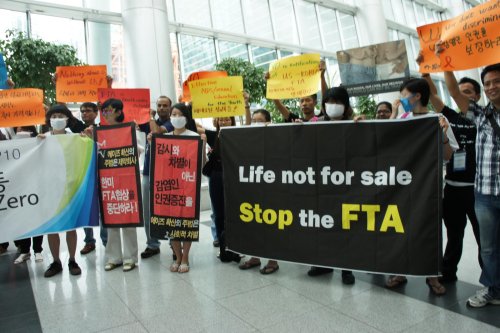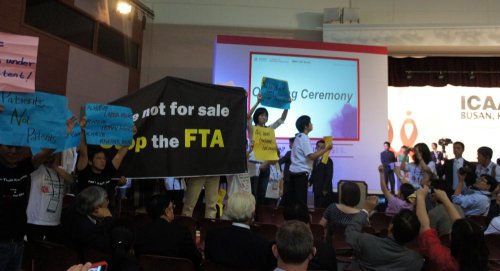
Healthdev.net | 27.08.2011
ICAAP10 2011: No Safe Avenue to Address Your Concerns
Submitted by Suksma Ratri
The 10th International Conference on AIDS in Asia and the Pacific (ICAAP10) has just begun a couple days ago. Busan, a beautiful city in South Korea has the privilege to host this event. As other conferences, ICAAP10 is an avenue to network, share, meet, advocate and build capacity of the community. Activists, advocates and scientists from around the world are gathered here to discuss the issues of HIV/AIDS, other interlinked issues and recent developments. Unfortunately, this year’s ICAAP has been turned upside down completely. An unexpected incident happened during the conference in Bexco Conference Hall and causes uproars.
Free Trade Agreement (FTA) has been a hot topic in the region and the activists agreed to join hands and conduct a peaceful protest by marching along the convention centre to voice out their message. At 2PM Korean time, the march begun peacefully but not for too long, because soon after, some police officers in civilian clothes started to take pictures of the protesters. Jang Seo-Yeon, a Korean activist and a public lawyer, quickly tried to stop this given the concerns regarding stigma and discrimination against PLHIV, people who use drugs, transgender and sex workers. The response from the police force was ghastly and more than 25 officers from Busan Police Station and the Presidential Security Service started to attack people in the march with no certain reasons. Jang Seo-Yeon was immediately arrested and given no explanations, even later she was threatened to receive criminal charges. Loon Gangte, activist from Manipur expressed that he has never been hurt this bad, both physically and mentally, by police violence in his whole life.
#SouthKorean Activist Arrested at #ICAAP10 from rishita nandagiri on Vimeo.
Many activists were injured during this physical contact. They were beaten, bashed, kneed, kicked and had their clothes ripped during an hour long confrontation. Some of the activists were arrested and two had to be rushed to the hospital. This is, of course, an unfortunate event. ICAAP should be a platform to exchange information, knowledge and experience. It should also be a safe avenue to convey concerns and message from the community. But this year, ICAAP has turned to be a battle field. The activists quickly drafted a statement letter which is signed by 84 organizations and individuals, expressing their disappointment and concerns of the existing anti-human rights and violent entities.
The attitude of the police force was unacceptable. But what is more disturbing is the fact that South Korea won the bidding to host this event. Previous to the bid, all countries participating in the bidding must have the understanding of the event itself and proper preparation at the country level should be done accordingly, including preparing the security force in dealing with such situation. The government of South Korea should have the knowledge that ICAAP is an arena for communities from diverse background, namely PLHIV, sex workers, LGBTQ, people who use drugs, migrants, youth and scientists to meet and hold discussions. South Korea seems to have failed their commitment as a host, which is providing safe and enabling environment for the activists to network, learn, exchange knowledge, share and address their concerns.
The problems actually occurred prior to the event. There are many activists and advocates who are denied visa to South Korea insignificantly. Those who are denied visa mainly transgender and sex workers advocates. In Nepal, a transgender advocate had her visa rejected for no apparent reason. The technical staff person and translator accompanying her to support her representation were authorised a visa but she was not. In Kolkata India, two sex workers, and a leading global expert on sex work and HIV were refused visas. They were from the Sonagachi Project, the world’s foremost HIV programme for sex workers. In addition they had to undergo numerous investigations and ‘authorised’ checks to ensure there were no ‘risks’ to entering South Korea. Kaythi Win, the chairperson of Asia Pacific Network of Sex Workers said, "This situation makes us all very upset- many of our members have paid a lot of money to come to this conference but now they have been denied entry. We had hoped to learn from the region’s leading experts on HIV and sex work, and to share this knowledge with other people. Thanks to the discrimination of the Korean Government we cannot do this. This ICAAP has become a second rate conference”.

Exclusion has also prevented People who use Drugs by the mere fact that Opiate Substitution Therapy (OST) is not able to be supplied to conference participants, effectively excluding yet another population group essential to any discussion taking place at ICAAP10. "We are angry for the situation people who use drugs have been put in to attend the 10th ICAAP. With no access to Opiate substitution medication, in spite of their willingness and the experiences and cross learning opportunities that the congress could provide, many have not been able to attend" said Bijay Pandey of the Asian Network of People who Use Drugs.
For the most part, activists thought that ICAAP10 demonstrates again that there is an urgent need to review the frequency of these events, the locations they are held, the millions of dollars spent and most importantly the lack of support provided to key advocates in the region, puts the whole of ICAAP10 to shame. I guess this year’s ICAAP theme: “Diverse Voices, United Action” sadly has failed to be taken into realization.
Statement by the activists regarding the unfortunate incident in ICAAP10:
We do not need anti-human right and violent ICAAP
There is no need for ICAAP suppressing the voice of people living with HIV/AIDS
1. Today at 2:00 pm AIDS activists and people living with HIV/AIDS from all over the world joined Korean activists in a peaceful anti-FTA march. FTA blocks the production of generic drugs and causes high drug prices. This can result in people living with HIV/AIDS not having access to ARV drugs. FTA means the death sentence of people living with HIV/AIDS. FTA is the reason of AIDS epidemic.
2. In the middle of the march, we witnessed that disguised police men took pictures of people joining the peaceful march in the Bexco conference hall.
When we protested to the police about illegal photo taking, more than 25 people from the Busan police station and special security team from the president office who supposed to provide security service for the Fiji president attacked people joining the march and tried to arrest people. All the participants of the community conference―PLHIV, sex workers, transgenders, IDUs, and sexual minorities―, were united to join the anti-FTA march and to stop the police violence. We tried to stop brutal police violence against peaceful march and speech and protected people from the illegal arrest.
Jang Seo-yeon, a member of the joint civil action group for ICAAP and a public lawyer, was arrested while protesting the illegal photo taking and police violence.
To block arresting her, people from the conference, PLHIV, sex workers, drug users and transgenders lied down in front of the police car to stop the police car. During a hour long confrontation, several people were physically abused by police men and security guards from the conference building. Also, several women and transgendered women were dragged by police and in by these violent police actions, their clothes were ripped. Several people living with HIV/AIDS were also beaten badly and verbally abused. Two people attending the conference had to be taken to the hospital.
3. We are asking why the police is present in the ICAAP where the place for discussion and finding solution for HIV/AIDS issues.
We also asking the why the organizing committee allowed the police presence and did not take any action to protect people from police harrassment.
Finally, we are asking to all of UN agencies including UNAIDS and WHO’s to respond and prevent this unjustifiable police actions against basic rights of people living with HIV/AIDS.
■ We ask the head of Busan police office to formally apologize for the illegal police survellience and violence.
■ We also ask the head of the Busan police office to formally apologize for the brutal police action on women, sex workers and transgender people.
■ We ask Jin Suhui, the head of the ministry of health and welfare, to apologize that public discussions and peaceful demonstrations at ICAAP conference were threatened and intimidated by the police.
■ We ask the organizing committee of ICAAP, the head of the Busan police office, and the head of the ministry of public health to prevent any further police surveillance and violence and to ensure that every participants at ICAAP can join any kinds of civil actions and public discussion without any harassments and intimidation by the police.
27th August, 2011
Joint Action of Korean participants at ICAAP10
Supporters (84 organizations and individuals):
ShalinaAzhar (India), Rajsherhor Ng (india), ANAND (India), Anrew Hunter (APNSW, Thailand), Laurindo Garch (Philippines), AlejanolrdTsossero (Malaysia), Greg Nunro (United Kingdom), Albion Street Center (Australia), SeunShwin (NAPWA, Australia), Niwat Suwanphtthama (Thailand), Scarlet Timor Collective (East-Timor), Monica, Agnes Khoo (Leeds University, United Kingdom), OKUP (Bangladesh), Caram Asia (Malaysia), Friends Frangipani (Papua New Gunea), Spiritia Foundation (Indonesia), Thai People who Living with HIV/AIDS (TNP+, Thailand), AIDS Access Foundation (Thailand), Foundation for AIDS Rights (Thailand), Thai NGO Coalition on AIDS (TNCA), Raks Thai Foundation, Thai Positive Women Network, Fiji Network Plus (FJN+), Pacific Islands AIDS Foundation (PIAF), OPSI (Indonesia Social Change Organization, Indonesia), Performa (Network of People Who Use Drugs in Indonesia), APNSW (Asia Pacific Networks of Sex Workers), Empower Foundation (Thailand), SWASH (Japan), Sathisamuha (Nepal), Wanthong Rattansongkroam (Thailand), Thai Pastive Women Network, Waanthong2509[@]gmail.com, Habiba_aas[@]yahoo.com, Info_aas[@]org.bd, Humbenleha-health.org, mojin[@]naver.com, adipbarus.sunu[@]gmail.com, India HIV/AIDS Allance (India), Gjarat State Network of PLHA (GSNP+, India), World Vision India (India), Udaau Trust/Nipashat (India), JorapornTonypablle (Thailand), Theu Positive Women Network (Thailand), Arerah Oumim, Rishita Nandagin, WGNRR (Women’s Global Network for Reproductive Rights), TJF (Malaysia), Scarlet Alliance (Australia), UNAIDS (Nepal), National Association of PSHA in Nepal (Nepal), Nava Kiran Plus (Nepal), Fiji Network for PLHIV (Fiji), IGAT Hope – Network for PLHIV (Papua New Guinea), Chow Sce let (Mynamar), RameiBeejn (India), HIV/AIDS Alliance (China), Ramir Ahbab (Philippines), 7 Sisters (Thailand), Kasal Bhardoaj (India), FRA WCIWH (India), Niraj Singh (Fiji Island), Zula (UNFPA, Mongolia), APNSW Malaysia, APNSW Japan, YAP UNFPA Thiland, NFWLHA Nepal, Grassrooted (Sri Lanka), ITPC (Thailand), Scarlet Alliance - Australian Sex Worker Association, APTN (Malaysia), Garldon Youth Community (India), Jason Mikkell (Fiji), Rani Railatikau (Fiji), Simon Kanger Forde (New Zealand), Jason Lee (Australia), Jun Hui Lee (Korea), Yeon Kim (Korea), Ariel Herrera (USA), Shy Amal Dutta (Bangladesh), Shin-ae Care (Korea)